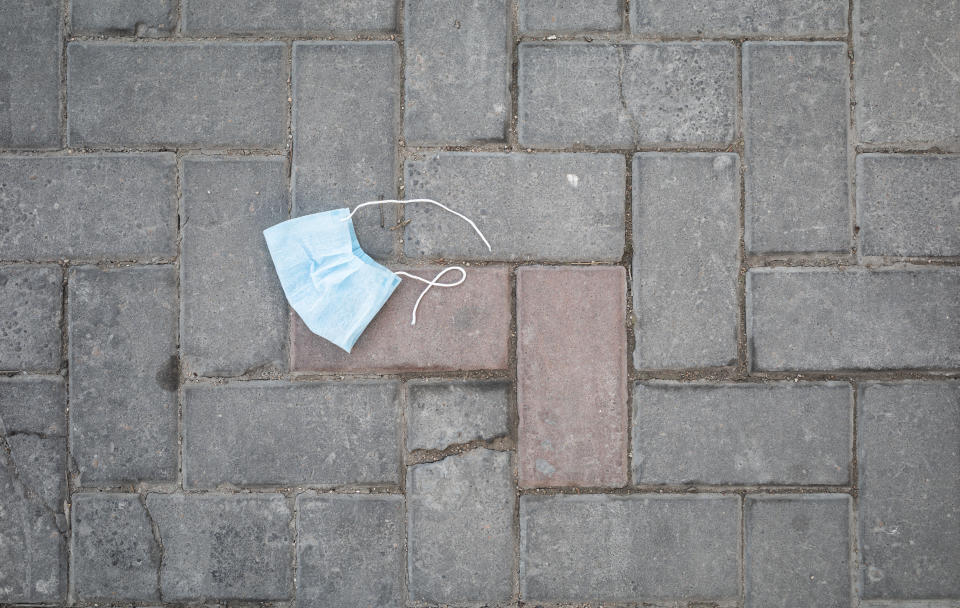Is The Coronavirus Crisis Over?
As quarantine fatigue sets in, states continue to lift lockdowns, and people (justifiably) focus on the public health crisis of systemic racism, many are wondering if the coronavirus pandemic is over. Or, at the very least, not as much of a problem.
The answer? Nope. Absolutely not. No. The pandemic is not over and it is still a very real issue.
As of this week, the number of confirmed coronavirus cases in the world has exceeded over 6.6 million. In the United States, more than 1.8 million cases have been recorded and more than 108,000 people have died so far from COVID-19.
It’s a major health risk to ignore the pandemic or think it’s no longer a threat — especially given the fact that a large number of people don’t display any symptoms of the disease. The Centers for Disease Control and Prevention estimates that around 35% of COVID-19 infections are symptomless. Other data from Iceland found that up to 50% of people who tested positive for COVID-19 didn’t show any symptoms.
Many people could be spreading the disease ― especially now, when people aren’t as concerned about it ― without knowing it. That puts people over the age of 65, those with preexisting conditions and many others in danger. (Even children, who were once thought to not experience as severe consequences from COVID-19.)
A few glimmers of good news have surfaced regarding the virus: Scientists are making progress on treatments and vaccines. Experts have said that the virus doesn’t spread as easily outdoors and that your chances of contracting it in a pool aren’t high if you’re not around a ton of people ― welcome discoveries given that summer is almost here.
Alberto Zangrillo, the head of the San Raffaele Hospital in Milan, told Reuters last Sunday that he is anecdotally finding that the coronavirus may be losing its potency. The viral load in patients arriving at the hospital appeared to be much smaller compared to a few months ago, he said. However, epidemiologists and the World Health Organization noted that there’s no scientific evidence that supports Zangrillo’s observations, and data currently shows that there’s no change in the virus’ severity.

All that said, it’s vital to remain vigilant. We’re not going to mince words: Wearing face masks or coverings is a pain in the ass, especially when it’s hot outside, but you have to do it. You still need to wash or disinfect your hands often. Social distancing as much as possible is still necessary. (Even if the weather is nice. Even if your friends are going out. Even if you think you won’t get the virus.)
If you’re protesting, it’s understandably a bit harder to follow the general guidelines that prevent transmission, but you can do several things to lower your risk, health experts said.
Make sure you wear a face mask and bring hand sanitizer with you. Wear safety goggles if you can: They’ll protect your eyes from tear gas and prevent you from reaching up and touching them (or your face) with your hands, which is an easy way to potentially spread the virus.
Remind yourself and others that COVID-19 is still a problem. As the daily briefings dissipate and cities reopen, it’s still important to be careful. Taking health precautions will be key to controlling the virus until there’s an effective treatment and/or a thoroughly vetted vaccine. Unfortunately, that might not be for a while ― even if so many people and politicians are making it seem otherwise.
“Normal” may never look like the normal we lived in before. But it’s worth it to save lives.
This article has been updated with additional information regarding claims that the viral load of the novel coronavirus has decreased over time.
Experts are still learning about the coronavirus. The information in this story is what was known or available as of press time, but it’s possible guidance around COVID-19 could change as scientists discover more about the virus. Please check the Centers for Disease Control and Prevention for the most updated recommendations.
A HuffPost Guide To Coronavirus
Stay up to date with our live blog as we cover the COVID-19 pandemic
7 essential pieces of relationship advice for couples in quarantine
What you need to know about face masks right now
How to tell if you need to start doing online therapy
Lost your job due to coronavirus? Here’s what you need to know.
Parenting during the coronavirus crisis?
What coronavirus questions are on your mind right now? We want to help you find answers.
Everyone deserves accurate information about COVID-19. Support journalism without a paywall — and keep it free for everyone — by becoming a HuffPost member today.
Love HuffPost? Become a founding member of HuffPost Plus today.
This article originally appeared on HuffPost.

